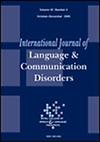Work-Related Quality of Life and Well-Being of Speech and Language Therapists in Ireland
Abstract
Background
Few studies have examined well-being among speech and language therapists (SLTs), and no study to date has examined quality of working life. Research is also needed to better understand how individual and organisational factors influence quality of working life and well-being of SLTs.
Aims
The aims of this study were to characterise quality of working life and well-being in Irish SLTs and determine the impact of individual and organisational factors on quality of working life and well-being.
Methods
SLTs in Ireland (N = 105) completed a cross-sectional, electronic survey in the summer of 2022 which included measures of work-related quality of life, organisational constraints, well-being, workload and turnover intentions.
Results
Well-being and quality of work-life scores were lower than published norms. Higher workload and higher organisational constraints were both related to lower quality of working life, F(4, 104) = 21.904, p < 0.001, and higher organisational constraints were related to lower well-being, F(1,103) = 20.269, p < 0.001. Lower quality of working life in turn predicted higher turnover intention, F(1,103) = 31.502, p < 0.0005.
Conclusions and Implications
The results indicate the importance of organisational constraints in relation to both quality of work life and well-being of Irish SLTs. Workload is also an important factor related to quality of work life. Lower quality of working life is a problem for the SLT profession as it relates to higher turnover intention. This study demonstrates the importance of exploring the work experience of SLTs and highlights working conditions that may lower quality of working life and result in SLTs leaving the sector.
WHAT THIS PAPER ADDS
- Although QoWL has been widely examined in the healthcare sector, there has been very little examination of the QoWL of SLTs. Similarly, few studies have been conducted examining the well-being of SLTs.
- This is the first study to examine QoWL and well-being in Irish SLTs. QoWL and well-being levels are low when compared to normative data in healthcare workers. Higher organisational constraints and higher workloads were related to lower QoWL, and higher organisational constraints were also related to lower well-being. Lower QoWL in turn was related to higher turnover intentions.
- QoWL and well-being for Irish SLTs are lower than expected and compare unfavourably with other healthcare professionals. Constraints faced by SLTs in their day-to-day work must be examined in order to alleviate the potential for stress and poor well-being. Workload in particular will require resourcing in order to improve QoWL.


 求助内容:
求助内容: 应助结果提醒方式:
应助结果提醒方式:


